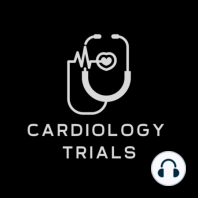10 min listen
Review of the HORIZONS-AMI trial
ratings:
Length:
8 minutes
Released:
Mar 28, 2024
Format:
Podcast episode
Description
N Engl J Med 2008; 358:2218-2230Background The use of percutaneous coronary intervention (PCI) is associated with improved outcomes in patients with ST-segment elevation myocardial infarction (STEMI). Nonetheless, there was a need to further improve survival rates. As seen in OASIS-6, the 30-day mortality in the control arm was still high at 8.9%. Glycoprotein IIb/IIIa inhibitors emerged as a potential solution. US clinicians widely adopted these agents; their use soared to over 90% of STEMI cases undergoing primary PCI. But IIb/IIIa inhibitors increase the risk of bleeding and thrombocytopenia.Cardiology Trial’s Substack is a reader-supported publication. To receive new posts and support my work, consider becoming a free or paid subscriber.Bivalirudin, a direct thrombin inhibitor, has been shown to reduce bleeding when used instead of heparin plus glycoprotein IIb/IIIa inhibitors in patients with ACS without ST segment elevation. The Harmonizing Outcomes with Revascularization and Stents in Acute Myocardial Infarction (HORIZONS-AMI) trial sought to test the hypothesis that bivalirudin is superior to the combination of heparin plus glycoprotein IIb/IIIa inhibitors in patients with STEMI who were undergoing primary PCI.Patients Patients were enrolled if they were within 12 hours from the onset of symptoms and had ST-segment elevation of 1 mm or more in two or more contiguous leads, new left bundle-branch block or had posterior myocardial infarction. There were numerous exclusion criteria including bleeding diathesis, coagulopathy, intracerebral mass, prior hemorrhagic stroke, platelet count< 100,000 cells/ ml, hemoglobin< 10 g/dl plus many more.Baseline characteristics The trial enrolled 3,602 patients. The average age of patients was 60 years and 77% were men. About 53% had hypertension, 43% had hyperlipidemia, 16% had diabetes, 11% had prior myocardial infarction and 46% were current smokers. The majority of patients were stable, with 91.5% classified as Killip class I. Primary PCI was performed in about 93% of the patients and coronary artery bypass graft surgery in 1.7%.Heparin before coronary angiography was administrated in 76.3% in the heparin plus glycoprotein IIb/IIIa inhibitor arm and 65.8% in the bivalirudin arm. During coronary angiography heparin was administered in 98.9% patients in the heparin plus a glycoprotein IIb/IIIa inhibitor arm and 2.6% in the bivalirudin arm. Glycoprotein IIb/IIIa inhibitors were given to 94.5% patient in the heparin plus glycoprotein IIb/IIIa inhibitors arm and 7.2% in the bivalirudin arm.Procedures The trial was open-label and patients were randomly assigned 1:1 to receive unfractionated heparin plus a glycoprotein IIb/IIIa inhibitor or bivalirudin alone. Heparin was administered to keep activated clotting time of 200 to 250 seconds. An initial intravenous bolus of 60 IU/ kg was given followed by boluses as needed. Bivalirudin was administered intravenously with an initial bolus of 0.75 mg/kg followed by an infusion of 1.75 mg/kg/hour. A glycoprotein IIb/IIIa inhibitor was administered before PCI in all the patients in the heparin group. It was also administered in selected patients in the bivalirudin group if there was no reflow or there was a large thrombus after PCI. The main glycoprotein IIb/IIIa inhibitors used were abciximab or eptifibatide.Endpoints The study had two primary endpoints at 30-days. The first endpoint was major bleeding not related to coronary artery bypass graft surgery. The second endpoint was a composite endpoint of major bleeding, all-cause death, reinfarction, target-vessel revascularization for ischemia or stroke.Analysis was performed based on the intention-to-treat principle. Assuming a 30-day event rate of 9% for the first endpoint and 12% for the second endpoint in the heparin plus glycoprotein IIb/IIIa inhibitor group and 6% for the first endpoint and 9% for the second endpoint in the bivalirudin group, a sample size of 1,700 patients in each group would
Released:
Mar 28, 2024
Format:
Podcast episode
Titles in the series (41)
Review of the GISSI-2 Trial by Cardiology Trials
